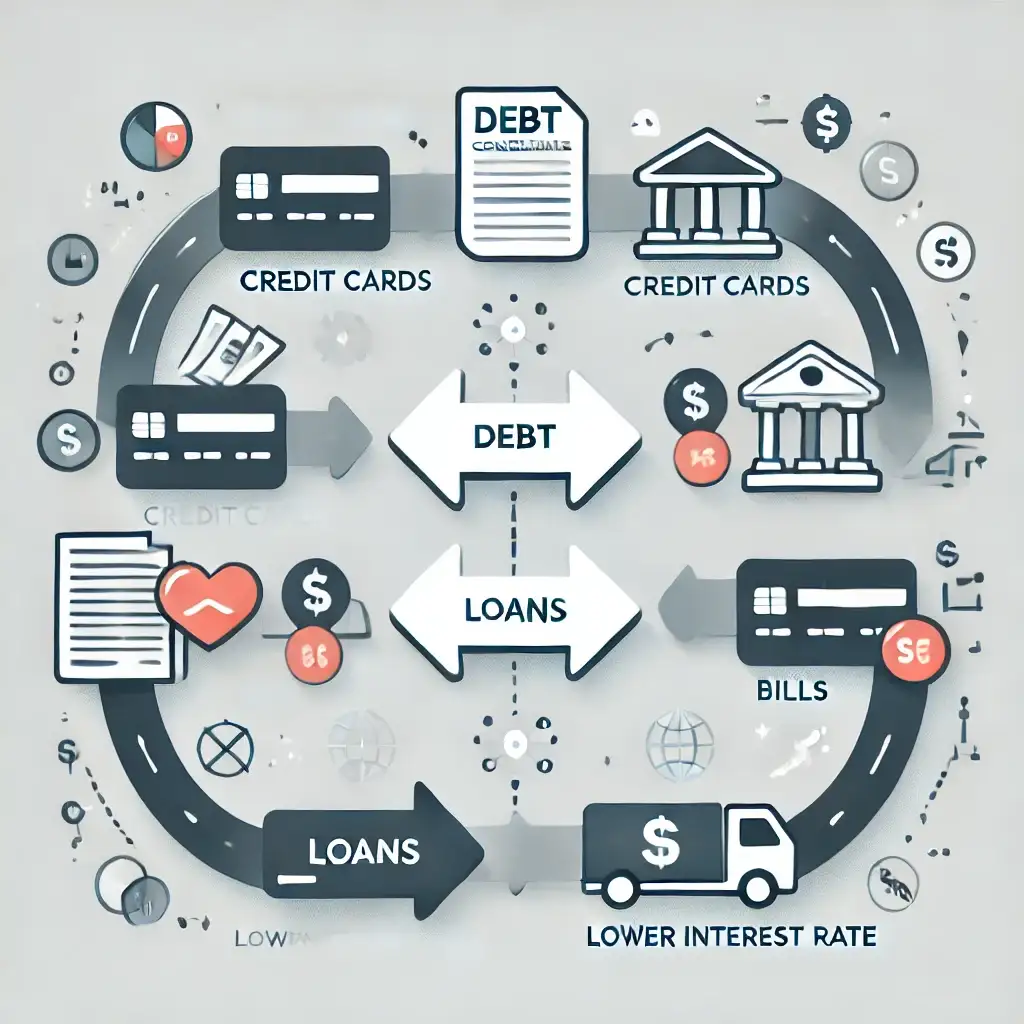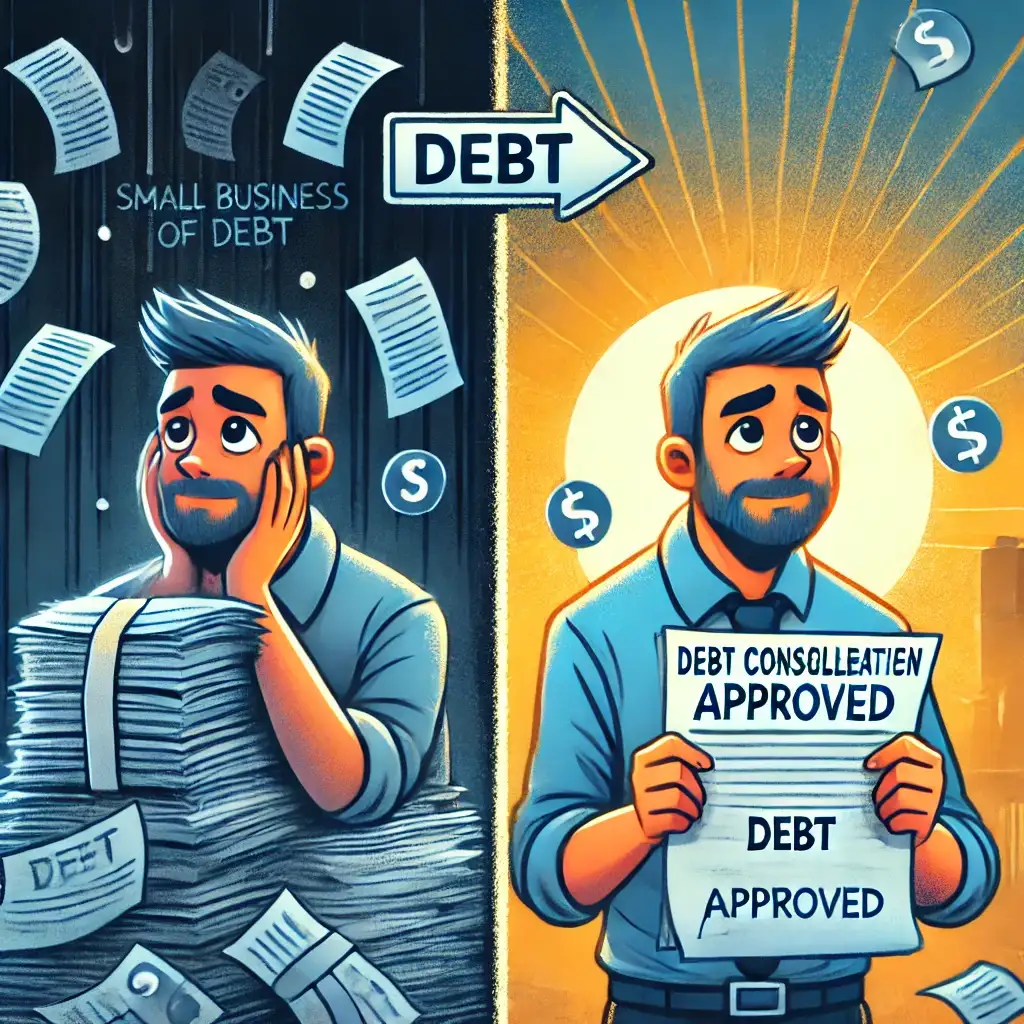Contents
Jason’s Debt Dilemma
Jason, a passionate small business owner, watched his dream café flourish—until multiple loans and credit card debts started choking his cash flow. Managing separate payments with high interest rates became overwhelming, and soon, he struggled to stay afloat. Like many entrepreneurs, Jason needed a way to simplify his financial obligations. Debt consolidation became his lifeline.
If you’re in Jason’s shoes, don’t panic. A well-planned debt consolidation strategy can help streamline payments, reduce interest rates, and improve your financial stability. In this guide, we’ll break down practical debt consolidation methods tailored for small business owners, using simple, actionable steps.
Understanding Debt Consolidation

Debt consolidation is the process of combining multiple debts into a single loan or payment plan, often with a lower interest rate. This strategy helps small business owners manage their finances more efficiently and reduce financial stress.
Why Consider Debt Consolidation?
- Simplifies multiple payments into one
- Lowers interest rates (potentially saving thousands)
- Improves cash flow management
- Reduces the risk of missed payments and penalties
- Can improve credit score over time
According to the U.S. Small Business Administration (SBA), 30% of small businesses fail due to financial mismanagement, often caused by overwhelming debt obligations. Debt consolidation can be a game-changer for entrepreneurs seeking financial relief.
Top Debt Consolidation Strategies for Small Business Owners

1. Small Business Debt Consolidation Loan
A small business debt consolidation loan allows you to combine multiple high-interest debts into one loan with a lower interest rate.
How it Works:
- Apply for a loan from a bank, credit union, or online lender.
- Use the loan to pay off existing debts.
- Repay the new loan in fixed monthly installments.
Best For: Businesses with a solid credit history and steady revenue.
Where to Find These Loans:
- Traditional Banks: Lower interest rates but strict approval criteria.
- Online Lenders (e.g., Fundera, OnDeck): Faster approval but slightly higher interest rates.
- Credit Unions: More flexible terms for members.
2. Business Credit Card Balance Transfer

If you have high-interest business credit card debt, transferring your balance to a 0% APR introductory credit card can save significant money.
How it Works:
- Open a new business credit card with a 0% APR promotional period.
- Transfer high-interest balances to the new card.
- Pay off the balance before the promotional period ends (usually 12–18 months).
Best For: Business owners with good credit and discipline to pay off the debt within the promo period.
3. SBA Debt Consolidation Loans
The Small Business Administration (SBA) 7(a) Loan Program offers debt consolidation options with lower interest rates and longer repayment terms.
How it Works:
- Apply through an SBA-approved lender.
- Use the funds to pay off existing debts.
- Repay the SBA loan in manageable installments.
Best For: Established businesses with a strong financial track record.
4. Merchant Cash Advance (MCA) Consolidation
If your business relies on daily credit card sales, consolidating multiple MCAs into one structured payment plan can help ease financial strain.
How it Works:
- Work with a lender who specializes in MCA consolidation.
- Negotiate a repayment plan with lower daily deductions.
Best For: Businesses stuck in a cycle of high MCA payments.
5. Business Line of Credit
A business line of credit provides flexible access to funds, allowing you to consolidate debt at a lower interest rate while maintaining liquidity.
How it Works:
- Apply for a revolving line of credit.
- Use the credit to pay off high-interest debts.
- Repay as needed, only paying interest on what you borrow.
Best For: Businesses with unpredictable cash flow.
Important Considerations Before Consolidating Debt
- Assess Your Financial Health: Ensure your business has a stable revenue stream to manage the new payment structure.
- Check Interest Rates & Fees: Not all consolidation options are cost-effective. Read the fine print.
- Improve Your Credit Score: A higher credit score can unlock better loan terms.
- Compare Lenders: Look for reputable lenders with favorable repayment terms.
Final Thoughts: Regaining Financial Control

Debt consolidation isn’t a one-size-fits-all solution, but for many small business owners like Jason, it can provide a clear path to financial relief. By choosing the right strategy, you can reduce interest costs, streamline payments, and regain control of your business finances.
What steps will you take today to consolidate your business debt and secure your financial future?

👋 Hi, I’m Jaiveer Hooda, the content creator behind Grow Your Money Smart!
I’m passionate about exploring the world of personal finance and sharing actionable insights to help you manage debt, plan for a secure retirement, and create passive income streams. 💡 My goal is to simplify complex financial topics and empower you to make smarter money decisions.
Let’s grow your wealth together, one smart move at a time! 💸
